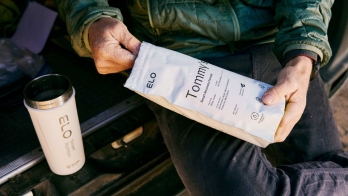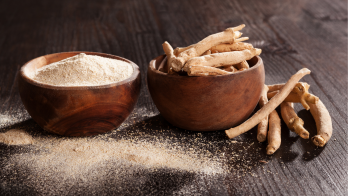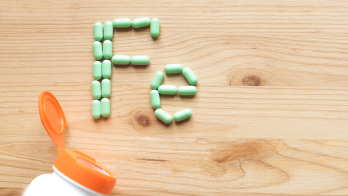The ultimate guide to post-workout nutrition
Wondering if you’re getting the proper nutrition after a workout to optimize your performance and recovery? Here’s everything you need to know about post-workout nutrition, including the essential nutrients and supplements that can boost recovery and improve performance.

Contents
Why is post workout nutrition important? Key post-workout nutrients Post workout nutrition timing Post workout supplements to consider What to eat after a workout: Post workout meal and snack ideas Post workout nutrition for weight loss Post workout nutrition for muscle gain Other articles and FAQs about post-workout nutrition Summary Key takeaways ReferencesPost-workout nutrition is essential for recovery and overall athletic performance. From replacing lost electrolytes and replenishing depleted energy stores to boosting muscle repair and recovery, what you eat and drink after a workout can make or break your results. This guide will teach you everything you need to know about post-workout nutrition —from why it’s important to what you should be eating— to maximize your gains and get the most out of your workouts.
Why is post workout nutrition important?
During a tough workout, certain physiological changes occur that impact your nutrition needs. Muscle fuel stores become depleted, and your body loses fluid and electrolytes in sweat. Tough workouts also damage muscle fibers, increase inflammation, and depress your immune system.
In this guide, we’ll dive deeper into what you should eat and drink after a workout. First though, it is important to understand the main physiological changes that happen when you exercise that make post-workout nutrition so essential.
Exercise depletes fuel, fluids, and electrolytes
During exercise, your body taps into its fuel and fluid reserves to power your muscles and movements, which can leave you feeling sluggish and slow your recovery.
The oxidation of fat and carbohydrate provides energy for contracting muscles. Fat is the primary energy source for low-intensity exercise, but as intensity increases, your body shifts to using more carbohydrates (glucose) for fuel. During your workout, your body taps into its glucose reserves (also known as glycogen), converting glycogen back into glucose to power those hard-working muscles. The longer and harder you exercise, the more glycogen you’ll use and need to replenish afterward [ 1
In addition to depleting your energy stores, the body loses fluids and electrolytes during exercise. During challenging athletic events, it is not uncommon for athletes to lose 6–10% of body weight through sweat [ 2 2
Exercise breaks down muscle tissue
Muscle fibers stretch and contract during exercise, causing tiny muscle tears. If you’ve ever felt sore after a workout, you’ve experienced this firsthand. After training, the body repairs damaged muscles and builds new muscle tissue to increase muscle strength, size, and efficiency [ 3 3
Exercise causes inflammation and immune suppression
Prolonged, strenuous exercise increases inflammation and dampens the body’s immune response [ 4 5 3
While inadequate nutrition can compound exercise-induced inflammation and immune suppression, research shows proper post-workout nutrition can help mitigate these effects [ 6
Now that you know why post-workout nutrition is important, let’s dive into what nutrients you need and when you should start refueling after a workout to optimize your recovery.
Key post-workout nutrients
After a workout, the most important nutrients to consume are carbohydrates, protein, and fluid [ 3
Here’s more on what these nutrients do and how much you should aim to get after a workout.
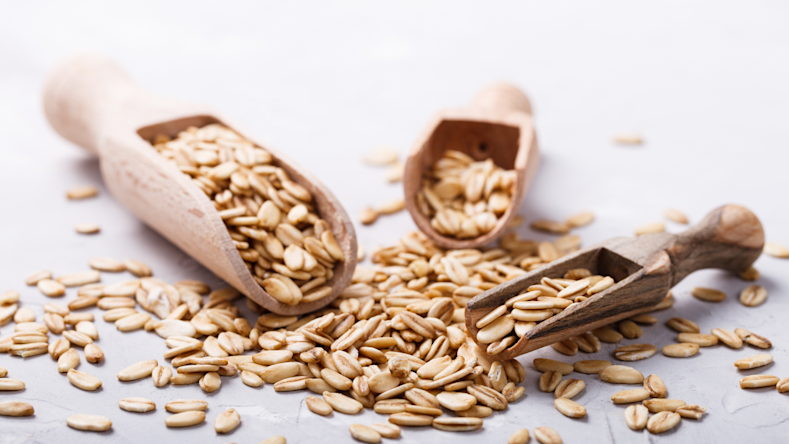
Carbohydrates
Carbohydrates are the body’s preferred fuel for working muscles and are a key part of post-workout nutrition. After a workout, your body needs carbohydrates to stabilize blood sugar levels and replenish depleted muscle and liver glycogen stores.
Wondering how many carbs you need after a workout to optimize recovery? It depends on how much you weigh and how hard you’re training.
After a moderate- to high-intensity workout lasting
>
45 minutes: Consume 45-90 g of carbohydrates within one hour of finishing.For high-volume intense training (e.g., 3–6 hours per day of intense training, 5–6 days per week): Aim to get 1.2 g/kg/hr of carbohydrates for the first 4-6 hours into recovery [
3
,6
].
Your activity level and total carbohydrate intake also play a role in recovery. For optimal performance and recovery, here’s how many carbohydrates you need each day based on your activity level:
Normal activity level: 45%-55% calories from carbohydrates (3–8 g/kg/day) [
20
]Endurance athlete >2hr training/day: >60% calories from carbohydrates (5–8 g/kg/day) [
6
]
When choosing carbs, whole-grain, high-fiber carbohydrates offer a myriad of benefits and should make up the bulk of your carb intake during the day. That said, quick-digesting carbohydrates (like white bread, bagels, pasta, energy bars, sports drinks, and juice) can be useful immediately after exercise since they are easy to digest, provide quick energy, and can speed up recovery.
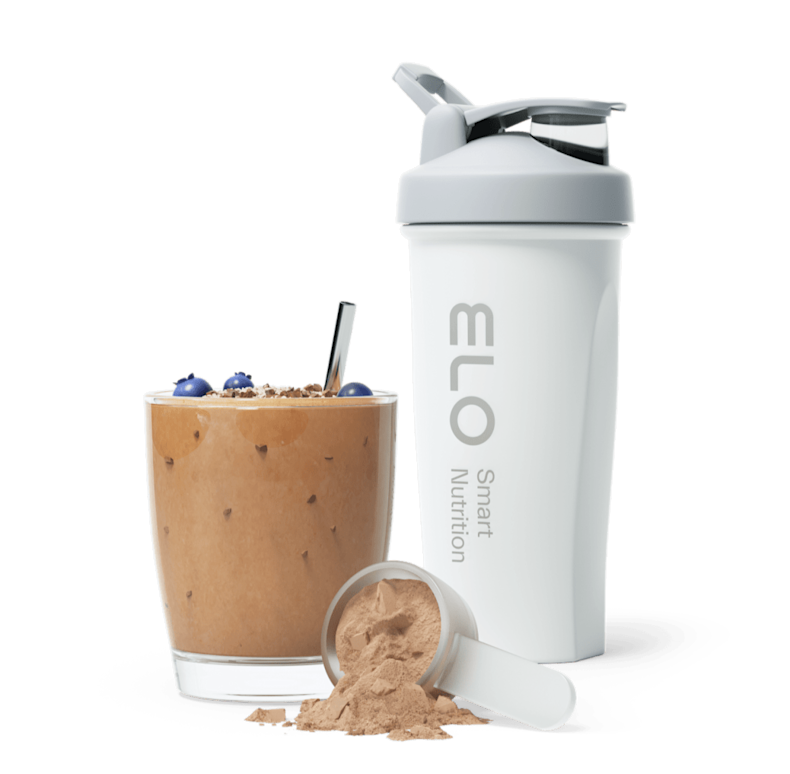
Protein
Protein comprises various amino acids and plays a crucial role in cell regulation, nerve function, and muscle synthesis [ 7 8
Studies show that consuming 20-40 g of high-quality protein within two hours of exercise stimulates robust increases in muscle protein synthesis that can benefit both recovery and future performance [ 3 3
The daily recommended protein intake for adults ranges from 0.8-1.2 g/kg/day, though some athletes may need up to 2.2 g/kg/day [7] Elo Smart Protein
While post-workout protein is key for recovery, the importance of meeting your daily protein goals to support recovery and performance cannot be understated. Research shows it's just as, if not more important than post-workout protein intake alone [ 3
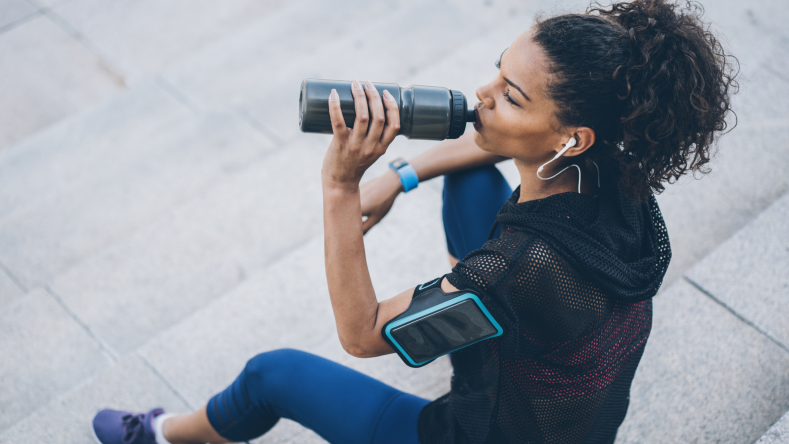
Fluids
Once your workout is over, you must also replenish the fluids and electrolytes lost in the sweat you produced. Rehydrating after a challenging workout is vital for maintaining normal body function, delivering key nutrients to tired muscles, and removing metabolic byproducts and toxins from the body. Severe dehydration can have serious consequences, but even mild dehydration can slow recovery and cause tiredness, headaches, and dizziness. Studies also show that dehydration worsens muscle soreness in the days following exercise [ 9
The easiest way to measure fluid loss is to weigh yourself before and after exercising. To rehydrate, you’ll need about 3 cups of water (24 fluid ounces) for every pound lost [ 6
In addition to drinking fluids, electrolytes (including sodium, potassium, calcium, magnesium, and chloride) are critical for muscle and nerve function and for regulating fluid balance.
If you’re working out for longer than 45 minutes, are exercising in a hot and humid environment, or if you’re a salty sweater, you may benefit from sipping on an electrolyte-enhanced sports drink after exercising [ 10 10
Post workout nutrition timing
When it comes to post-workout nutrition, time is of the essence. After a workout, your body immediately goes into repair mode, rebuilding muscle tissue and replenishing depleted glycogen stores. Timing matters because your body’s ability to utilize critical nutrients increases directly after exercise, but only for a short period.
Research shows the optimal time to start replenishing fuel and fluid is 15-60 minutes after you finish exercising [
11
].
That’s not to say your body will stop rebuilding glycogen and protein after the one-hour mark, but how efficiently your body does these things decreases over time. In fact, delaying carbohydrate ingestion by as little as two hours can reduce the rate of muscle glycogen synthesis by 50% [ 3
Basically, the sooner you start replenishing fuel and fluid after a workout, the better.
Post workout supplements to consider
Once you’re prioritizing carbs, protein, and fluids immediately after exercise, you may wonder what else you can include in your post-workout nutrition plan to optimize recovery.
As it turns out, a handful of supplements (including tart cherry, creatine, glutamine, caffeine, and omega-3s) may have some post-workout perks worth considering.

Tart cherry juice
Tart cherries (different from the sweet cherries we all love) are rich in antioxidants and anti-inflammatory polyphenolic compounds. A growing body of research shows that tart cherry juice can improve performance, reduce pain, soreness and inflammation, and accelerate strength recovery after both strength and endurance exercises [ 12 13
Tart cherries can be found in various forms, including juice, capsules, and concentrate. Dosage recommendations vary depending on the preparation, but most studies have used 8-12 ounces (1 ounce if in concentrate form) twice a day, 4-5 days leading up to an event, and 2-3 days after to promote recovery [ 13
If you want to experiment with tart cherry juice, look for a product without additives and drink 8-12 ounces no more than 60 minutes before and after exercising. To reap all of the recovery benefits, continue taking it up to two times per day for 2-3 days after a race or competition.
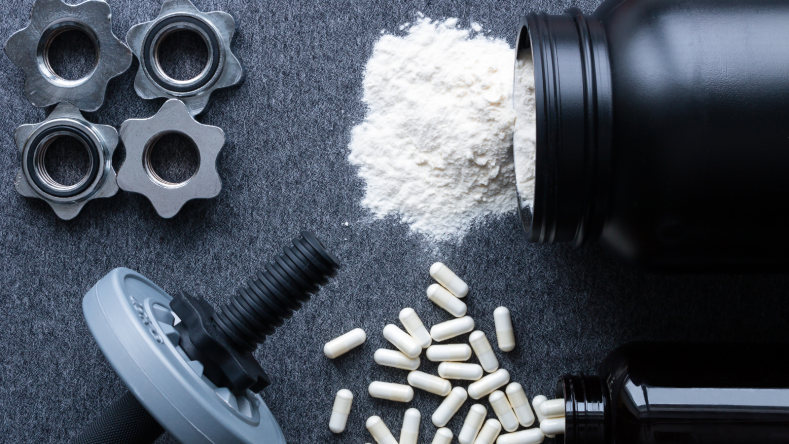
Creatine
One of the most thoroughly studied and widely used supplements in sports, creatine is an amino acid found in muscle tissue that is both synthesized by the body and obtained from the diet in small amounts [ 14
In addition to supporting energy production, muscle strength, and performance, evidence shows creatine may also have recovery benefits for both power athletes and endurance athletes alike. These recovery benefits include increased muscle protein synthesis, enhanced glycogen replenishment, and reduced delayed onset muscle soreness (DOMS) [ 15 15
Research to-date recommends starting with a “loading dose” of 20 g/day for 5-7 days, followed by 3-5 g/day thereafter for performance-enhancing benefits [ 14 15
One point worth noting is that taking creatine can increase water retention, and some athletes experience slight weight gain (1-2 kg) as a result.
Glutamine (L-glutamine)
Glutamine is the most abundant amino acid in muscle, blood, and the body’s free-amino-acid pool. It is synthesized in the body primarily from branched-chain amino acids (BCAAs), and is also consumed in protein-containing foods. [ 14
Research shows supplementation with glutamine reduced the magnitude of strength loss, accelerated strength recovery, and diminished muscle soreness more quickly than a placebo [ 14
Some athletes also supplement with glutamine for its supposed immune-boosting benefits; however, there is limited research currently supporting this use [ 14
Glutamine supplements, also commonly labeled as L-glutamine, are available in powder and capsule form. Daily dosages ranging from 0.21 - 0.42 g/kg are safe and effective for enhancing recovery in athletes [ 14
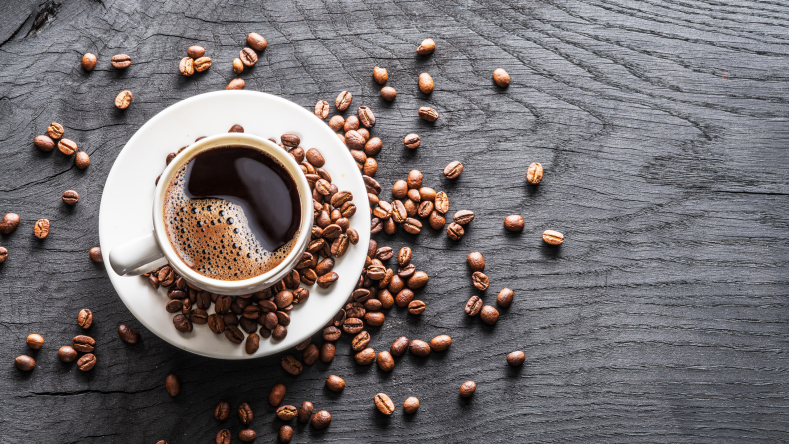
Caffeine
Good news, coffee lovers. In addition to enhancing performance while you exercise, caffeine consumed after exercise may also aid muscle recovery.
Recent research has found that post-workout caffeine paired with carbs (think a cup of coffee with milk alongside a balanced breakfast) can increase glucose levels, glycogen resynthesis rates, and glycogen accumulation after exercise [ 6 16
There are no dosing guidelines for post-workout caffeine. However, studies have found positive results with post-workout supplementation of 3-8 mg of caffeine/kg of body weight paired with meals that provided 0.8-1.2 g of carbs/kg and 0.3 g of protein/kg [ 6 17
For a 150-pound athlete, that’s equivalent to two to six 8-oz cups of coffee (200-545 mg of caffeine) alongside a meal providing 80 g of carbs and 20 g during a 4-hour recovery window.
If you’re sensitive to caffeine or don’t drink coffee regularly, you may want to start with a small amount or avoid it altogether. Consuming too much caffeine too close to bedtime can also get in the way of a good night's sleep and potentially hurt your recovery more than help. To minimize these effects, consume caffeine in the morning and in limited quantities until you know how your body responds.
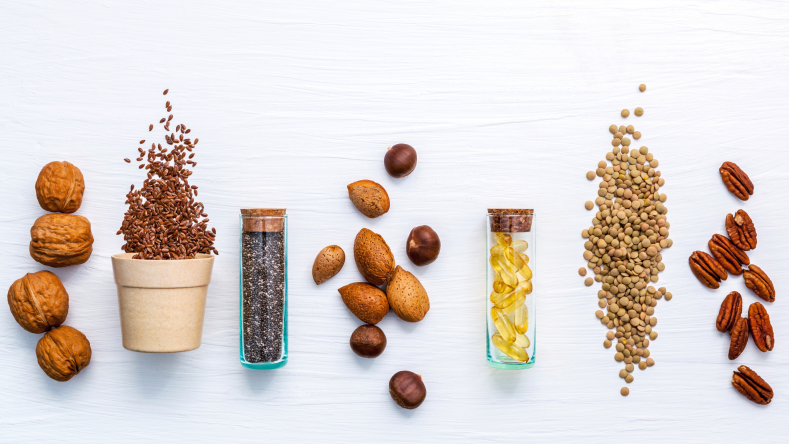
Omega-3s
Omega-3 fatty acids are essential fatty acids found predominantly in cold-water fatty fish, nuts, and seeds. Fish oil contains two important omega-3s unique to fish and seafood known as eicosapentaenoic acid (EPA) and docosahexaenoic acid (DHA) [ 18
Regarding exercise recovery, studies have shown the anti-inflammatory benefits of omega-3s may reduce soreness or enhance recovery from muscle-damaging exercise, which may benefit everyone, from individuals starting an exercise program to professional athletes [ 15
The daily recommendation for all omega-3s is 1,600 mg/day for men and 1,100 mg/day for women [ 18
A typical fish oil supplement provides about 1,000 mg (1 g) of fish oil with 180 mg EPA and 120 mg DHA; however, formulations and doses vary widely [ 18 15 18 18
What to eat after a workout: Post workout meal and snack ideas
If you’re looking for good foods to eat after a workout, we’ve got you covered. Here are 20+ post-workout snack and meal ideas packed with carbs, protein, and anti-inflammatory compounds to help your body refuel and recover faster.
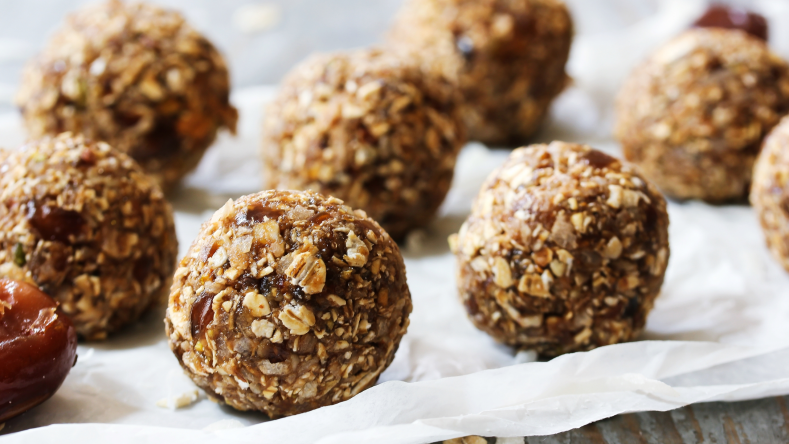
Quick post-workout snack ideas
Post workout protein shake made with fruit, Elo Smart Protein, and water or your milk of choice
8 oz of chocolate milk
Banana and Greek yogurt
Oatmeal energy bites or an energy bar
Granola, fruit, and yogurt parfait
Salmon and cream cheese bagel
Cottage cheese and fruit
Pita and hummus
Crackers and peanut or almond butter
String cheese and crackers
Cereal with milk and strawberries

Delicious post-workout meal ideas
Veggie egg or tofu scramble with 2 slices of whole grain toast
Oatmeal with Elo Smart Protein, banana, and walnuts
Whole grain pancakes or waffles topped with fresh fruit, almond butter, and a side of chicken or veggie sausage
Burrito with brown rice, beans, and all the salsa and guac you like
Whole wheat pasta topped with chicken breast and veggie marinara
Tuna-avocado sandwich
Salmon with baked sweet potato
Turkey wrap with veggies and vinaigrette
Hummus-crusted chicken with brown rice and roasted veggies
Black bean burger & oven-baked fries
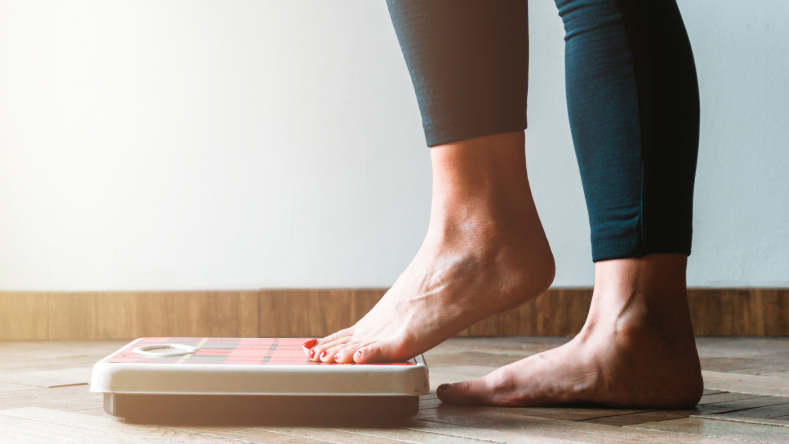
Post workout nutrition for weight loss
If you’re trying to lose weight, you might wonder if eating after a workout will move you closer or farther away from your weight loss goals.
Low-carbohydrate diets can be incredibly effective for weight loss, but extreme carbohydrate restriction can crush performance and recovery [ 19
Here are some recommendations that will support both weight loss and your workouts:
Aim to get 1.2-2.2 g of protein/kg/day divided into 4-6 meals or snacks.
Thirty minutes after a workout, have a snack or small meal consisting of 1 g of carbohydrate/kg and 0.5 g of protein/kg to promote muscle synthesis and minimize muscle breakdown.
When combined with training, time-restricted feeding can benefit fat loss while maintaining strength [
19
].Approach weight loss like your first 5K or century ride — slow and steady(ish).
Post workout nutrition for muscle gain
Universal findings show getting a combination of carbohydrates (50-75 g) and protein (20-75 g) after heavy resistance training promotes an increase in lean muscle mass and overall improvements in body fat percentage [ 3
To promote muscle gain, aim to get [ 3
20-40 g of high-quality protein + 50-75 g of carbohydrates <2 hours after exercise
20-40 g of quality protein every 3-4 hours throughout the day to achieve a daily protein intake of 1.2-2.2 g/kg of bodyweight
Other articles and FAQs about post-workout nutrition
If you’re curious about post-workout nutrition and recovery, here’s everything you need to know about protein powder protein shakes plant-based recovery meal and snack ideas
Summary
Working out is tough on the body and can leave you feeling sore, low on energy, and make you more susceptible to getting sick. From replenishing depleted energy and fluid stores to boosting muscle synthesis and recovery, what and when you eat or drink after a workout can profoundly affect your performance and overall health.
When it comes to post-workout nutrition, timing, carbohydrates, protein, and fluids should be your top priority as they play key roles in energy and fluid repletion, muscle protein synthesis, and overall recovery. In addition, supplements like tart cherry, creatine, glutamine, caffeine, and omega-3s may provide added benefits that enhance recovery and overall performance gains. Learn more about how Elo Health personalized protein smart supplements
Disclaimer: The text, images, videos, and other media on this page are provided for informational purposes only and are not intended to treat, diagnose or replace personalized medical care.
Key takeaways
After a workout, your body needs carbohydrates, protein, and fluids to stabilize blood sugar and heart rate, replenish depleted energy stores, and repair and build muscle tissue.
To support general recovery and performance gains, you should aim to get 20-40 g of protein, 45-90 g of carbs, and 2-3 cups of fluid per pound of body weight lost within 60 minutes of finishing your workout. Remember how long and intense your exercise will affect your specific needs.
Supplements like tart cherry, creatine, glutamine, caffeine, and omega-3s may provide added benefits that enhance recovery and overall performance gains.
Elo Health
can help you optimize your post workout nutrition routine withpersonalized protein
,smart supplements
, and 1:1 dietitian support.
References
Murray, B., & Rosenbloom, C. (2018). Fundamentals of glycogen metabolism for coaches and athletes. Nutrition reviews, 76(4), 243–259.
https://doi.org/10.1093/nutrit/nuy001
Popkin, B. M., D'Anci, K. E., & Rosenberg, I. H. (2010). Water, hydration, and health. Nutrition reviews, 68(8), 439–458. https://doi.org/10.1111/j.1753-4887.2010.00304.x
Kerksick, C., Harvey, T., Stout, J., Campbell, B., Wilborn, C., Kreider, R., Kalman, D., Ziegenfuss, T., Lopez, H., Landis, J., Ivy, J. L., & Antonio, J. (2008). International Society of Sports Nutrition position stand: Nutrient timing. Journal of the International Society of Sports Nutrition, 5(1).
https://doi.org/10.1186/1550-2783-5-17
Cerqueira, R., Marinho, D. A., Neiva, H. P., & Lourenço, O. (2020). Inflammatory Effects of High and Moderate Intensity Exercise—A Systematic Review. Frontiers in Physiology, 10.
https://doi.org/10.3389/fphys.2019.01550
Gleeson, M., Nieman, D. C., & Pedersen, B. K. (2004). Exercise, nutrition and immune function. Journal of Sports Sciences, 22(1), 115–125.
https://doi.org/10.1080/0264041031000140590
Kerksick, C. M., Wilborn, C. D., Roberts, M. D., Smith-Ryan, A., Kleiner, S. M., Jäger, R., Collins, R., Cooke, M., Davis, J. N., Galvan, E., Greenwood, M., Lowery, L. M., Wildman, R., Antonio, J., & Kreider, R. B. (2018). ISSN exercise & sports nutrition review update: research & recommendations. Journal of the International Society of Sports Nutrition, 15(1).
https://doi.org/10.1186/s12970-018-0242-y
Phillips, S. M., & Van Loon, L. J. (2011). Dietary protein for athletes: From requirements to optimum adaptation. Journal of Sports Sciences, 29(sup1), S29–S38.
https://doi.org/10.1080/02640414.2011.619204
Stark, M., Lukaszuk, J., Prawitz, A., & Salacinski, A. (2012). Protein timing and its effects on muscular hypertrophy and strength in individuals engaged in weight-training. Journal of the International Society of Sports Nutrition, 9(1).
https://doi.org/10.1186/1550-2783-9-54
Cleary, M. A., Sweeney, L. A., Kendrick, Z. V., & Sitler, M. R. (2005). Dehydration and symptoms of delayed-onset muscle soreness in hyperthermic males. Journal of athletic training, 40(4), 288–297.
https://www.ncbi.nlm.nih.gov/pmc/articles/PMC1323290/
Maughan R. J. (1991). Fluid and electrolyte loss and replacement in exercise. Journal of sports sciences, 9 Spec No, 117–142.
https://doi.org/10.1080/02640419108729870
Lemon, P. W., Berardi, J. M., & Noreen, E. E. (2002). The role of protein and amino acid supplements in the athlete's diet: does type or timing of ingestion matter?. Current sports medicine reports, 1(4), 214–221.
https://doi.org/10.1249/00149619-200208000-00005
Gao, R., & Chilibeck, P. D. (2020). Effect of Tart Cherry Concentrate on Endurance Exercise Performance: A Meta-analysis. Journal of the American College of Nutrition, 39(7), 657–664.
https://doi.org/10.1080/07315724.2020.1713246
Vitale, K. C., Hueglin, S., & Broad, E. (2017). Tart Cherry Juice in Athletes: A Literature Review and Commentary. Current sports medicine reports, 16(4), 230–239.
https://doi.org/10.1249/JSR.0000000000000385
Office of Dietary Supplements - Dietary Supplements for Exercise and Athletic Performance. (n.d.).
https://ods.od.nih.gov/factsheets/ExerciseAndAthleticPerformance-HealthProfessional/
Rawson, E. S., Miles, M. P., & Larson-Meyer, D. E. (2018). Dietary Supplements for Health, Adaptation, and Recovery in Athletes, International Journal of Sport Nutrition and Exercise Metabolism, 28(2), 188-199. Retrieved Feb 15, 2021, from
https://journals.humankinetics.com/view/journals/ijsnem/28/2/article-p188.xml
Loureiro, L. M. R., Reis, C. E. G., & da Costa, T. H. M. (2018). Effects of Coffee Components on Muscle Glycogen Recovery: A Systematic Review. International journal of sport nutrition and exercise metabolism, 28(3), 284–293.
https://doi.org/10.1123/ijsnem.2017-0342
Loureiro, L. M. R., Dos Santos Neto, E., Molina, G. E., Amato, A. A., Arruda, S. F., Reis, C. E. G., & da Costa, T. H. M. (2021). Coffee Increases Post-Exercise Muscle Glycogen Recovery in Endurance Athletes: A Randomized Clinical Trial. Nutrients, 13(10), 3335.
https://doi.org/10.3390/nu13103335
Office of Dietary Supplements - Omega-3 Fatty Acids. (2022, July 28).
https://ods.od.nih.gov/factsheets/Omega3FattyAcids-HealthProfessional/
Aragon, A. A., Schoenfeld, B. J., Wildman, R., Kleiner, S., VanDusseldorp, T., Taylor, L., Earnest, C. P., Arciero, P. J., Wilborn, C., Kalman, D. S., Stout, J. R., Willoughby, D. S., Campbell, B., Arent, S. M., Bannock, L., Smith-Ryan, A. E., & Antonio, J. (2017). International society of sports nutrition position stand: diets and body composition. Journal of the International Society of Sports Nutrition, 14(1).
https://doi.org/10.1186/s12970-017-0174-y
Institute of Medicine, Macronutrients, P. O., Intakes, S. C. O. T. S. E. O. D. R., Institute of Medicine, Panel on Macronutrients, & Standing Committee on the Scientific Evaluation of Dietary Reference Intakes. (2005). Dietary Reference Intakes for Energy, Carbohydrate, Fiber, Fat, Fatty Acids, Cholesterol, Protein, and Amino Acids. Amsterdam University Press.



